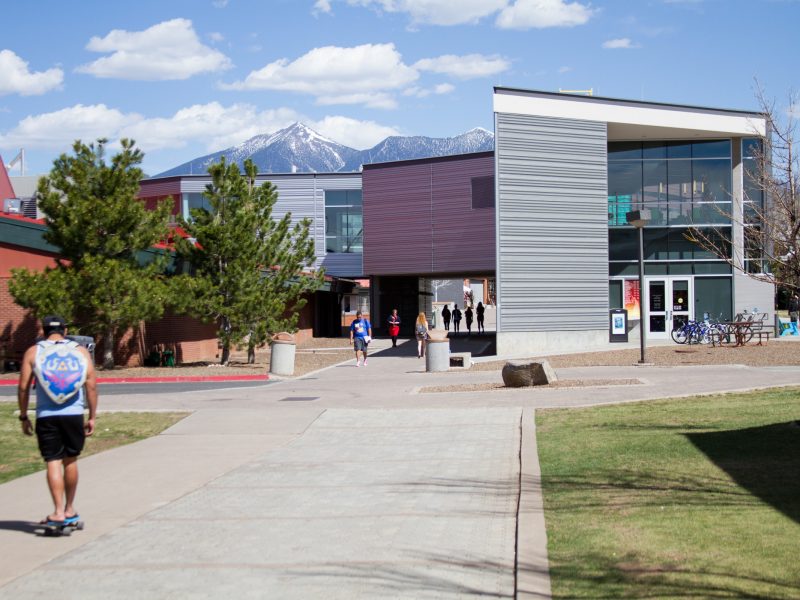Student wins annual 3MRP competition
Golden toads, the effect of uranium on human skin cells, research from hundreds of feet in the air and what asteroids tell us about the location of Planet X all got a brief—180 seconds, to be exact—moment in the spotlight this week at Northern Arizona University’s annual 3-Minute Research Presentation (3MRP) finals, held Tuesday at the High Country Conference Center.
Ten graduate student finalists got three minutes and one slide to present complex research in an engaging, informative manner to an audience that didn’t share their expertise. It is difficult, Associate Vice Provost for Academic Affairs John Masserini said, but the ability to communicate their work is critical.
“It’s not just about being able to speak to your peers,” he said. “You’ve got to be able to speak to various audiences from across the spectrum.”
Chelsey Tarazi, a doctoral student in combined counseling/school psychology, took first place with her presentation on what factors contribute to how adults respond to transgender youths in their children’s schools and how those feelings influence the likelihood of supporting safe and inclusive policies for gender-diverse students. Even when adults say they care about transgender youth, those youth report feeling marginalized in schools.
“The No. 1 takeaway from this research is that we can now see the implicit bias some adults have toward transgender and gender diverse youth,” she said. “By identifying the mere fact that adults do have implicit bias can make adults themselves more aware. By making adults more aware of this implicit bias, it can create real change for transgender youth in schools and ultimately change how they are treated.”
This data can be applied in many ways, including policy development at a state and federal level which is especially important now, Tarazi said, as transgender youth are fighting not only for equal rights but also for safety and inclusion in all parts of society.
Daniel Foley, who is earning a master’s degree in applied geospatial science, took second place with his research answering the question, “How can a map help feed the planet?”
He asked the audience to envision two futures: one in which humanity fought wars over water and people fled their homelands because of famine and drought, and one in which the 10 billion people predicted to live on Earth in the year 2050 have enough food and water. He looked at crop water productivity—crop per drop—and how to use water most effectively to grow the most crops. He found that changing the latitude at which crops are grown had the most effect on increasing crop per drop.
“The issues of food and water security in the 21st century are undeniably important and pressing matters on a global scale,” said Foley, who graduates in May. “Facing these challenges also can provide us with a great opportunity to make positive global changes, as feeding the planet is not a future generation’s problem to solve. It is ours.”
The competition started months ago with students submitting abstracts, undergoing coaching with subject librarians from Cline Library and presenting their research in a preliminary competition. Of the almost 70 applicants, 10 finalists presented to a crowd of a few hundred people, including NAU Office of Graduate and Professional Studies Dean Maribeth Watwood and NAU President Rita Cheng.
“Each year our 3MRP group gets bigger and our audience gets bigger, and I think that’s a tribute to the growing recognition of the quality of research done on our campus,” Cheng said. “The growing number of graduate students is something we’re proud of.”
From here, Tarazi, Foley and third-place winner Melissa Enright will compete in the Southwest Showdown at the University of Nevada, Reno on April 27.
Read more in The NAU Review.
